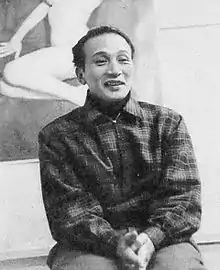Shichirō Fukazawa
Shichirō Fukazawa (深沢 七郎, Fukazawa Shichirō, January 29, 1914 – August 18, 1987) was a Japanese author and guitarist whose 1960 short story Fūryū mutan ("Tale of an Elegant Dream") caused a nationwide uproar and led to an attempt by an ultranationalist to assassinate the president of the magazine that published it.[1]
Shichirō Fukazawa | |
|---|---|
 | |
| Born | January 29, 1914 Isawa, Japan |
| Died | August 18, 1987 (aged 73) Japan |
| Occupation | Author |
| Genre | Fiction |
Biography
Fukazawa was born in Isawa, Yamanashi, Japan.[2] His first novel, The Ballad of Narayama (楢山節考, Narayama bushikō), won the prestigious Chūō Kōron Prize,[3] announcing his status as a rising star in the literary world, and has twice been adapted for film: first by Keisuke Kinoshita in 1958,[4] and again by Shōhei Imamura in 1983.[5] Imamura's film won the Cannes Film Festival Palme d'Or.[6]
Shimanaka Incident
In the fall of 1960, the mainstream monthly magazine Chūō Kōron published his satirical short story Furyū mutan (風流夢譚, “The Tale of an Elegant Dream").[7] In the story, an unnamed protagonist narrates a dream sequence in which leftists take over the Imperial Palace and behead the Emperor and Empress, as well as the Crown Prince and Crown Princess, before an enthusiastic crowd.[7] This story provoked fury in the Imperial Household Agency and among Japanese right-wing ultranationalists.[7][8]
On February 1, 1961, in response to the story, Kazutaka Komori, a seventeen-year-old rightist, broke into the home of Hōji Shimanaka, Chūō Kōron magazine's president, killed his maid and severely wounded his wife.[9][10] Fukazawa received death threats on a daily basis,[9] and after offering a tearful public apology, went into hiding for five years.[11] His promising literary career went into a long hiatus, and although he later returned to writing, he never fully recovered his "rising star" status.[12] In later years, he could be found serving grilled bean cakes (imagawayaki) in a working class Tokyo neighborhood at a stall called "Dream Shop" (Yumeya).[12]
The aftermath of the Shimanaka incident (嶋中事件, Shimanaka jiken) meant that criticism of the Imperial Family, and discussion of the role or existence of the Emperor, became taboo.[10][13]
Selected prizes
- 1956 Chūō Kōron Prize for The Ballad of Narayama (Narayamabushi ko)[2][3]
- 1981 Tanizaki Prize for Michinoku no ningyotachi (みちのくの人形たち)[2]
Selected works
- Narayama bushikō, 楢山節考, 1956.
- Tōhoku no Zunmu-tachi, 東北の神武たち, 1957.
- 笛吹川, 1958.
- 言わなければよかったのに日記, 1958.
- 東京のプリンスたち, 1959.
- 千秋楽, 1964.
- 甲州子守唄, 1964.
- 人間滅亡の唄, 1966.
- 庶民烈伝, 1970.
- 盆栽老人とその周辺, 1973.
- 無妙記, 1975.
- 妖木犬山椒, 1975.
- Michinoku no ningyōtachi (みちのくの人形たち), 1979.
- Chotto ippuku meido no michikusa (ちょっと 一服 冥土 の 道草), Tōkyō : Bungei Shunjū, 1983.
- 極楽まくらおとし図, 1984.
Records
- Sobo no mukashigatari (Nippon Columbia 1973)
References
- Kapur, Nick (2018). Japan at the Crossroads: Conflict and Compromise after Anpo. Cambridge, Massachusetts: Harvard University Press. pp. 255–61.
- 深沢七郎/著 (in Japanese). Shinchosha. 2001-10-05. Retrieved 2009-01-28.
- 深沢七郎: 『楢山節考』 (in Japanese). ISIS. 2001-10-05. Retrieved 2009-01-28.
- Erickson, Hal. "The Ballad of Narayama". All Movie Guide. Retrieved 2009-01-28.
- Mannikka, Eleanor. "The Ballad of Narayama". All Movie Guide. Retrieved 2009-01-28.
- Mannikka, Eleanor. "The Ballad of Narayama: Awards". All Movie Guide. Retrieved 2009-01-28.
- Kapur, Nick (2018). Japan at the Crossroads: Conflict and Compromise after Anpo. Cambridge, Massachusetts: Harvard University Press. p. 256.
- "Jap Novelist's Dream Account Raises Furor". Charleston Daily Mail. Charleston, West Virginia: The Daily Gazette Company. Associated Press. 1960-12-01. p. 6.
The imperial household agency reacted angrily. There was talk of civil court action... An ultranationalist group in Tokyo, the "Greater Japan Patriotic Party," demanded the magazine issue an apology for printing the story.... Fukazawa... was reported hiding from possible physical attack from rightists.
- Kapur, Nick (2018). Japan at the Crossroads: Conflict and Compromise after Anpo. Cambridge, Massachusetts: Harvard University Press. p. 257.
- McNeill, David (December 12, 2005). ""What Role Japan's Imperial Family?"". The Asia Pacific Journal: Japan Focus. 3 (12).
- Kapur, Nick (2018). Japan at the Crossroads: Conflict and Compromise after Anpo. Cambridge, Massachusetts: Harvard University Press. pp. 258–59.
- Kapur, Nick (2018). Japan at the Crossroads: Conflict and Compromise after Anpo. Cambridge, Massachusetts: Harvard University Press. p. 259.
- Kapur, Nick (2018). Japan at the Crossroads: Conflict and Compromise after Anpo. Cambridge, Massachusetts: Harvard University Press. p. 261.